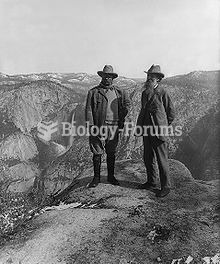|
|
|
To prove that stomach ulcers were caused by bacteria and not by stress, a researcher consumed an entire laboratory beaker full of bacterial culture. After this, he did indeed develop stomach ulcers, and won the Nobel Prize for his discovery.
Allergies play a major part in the health of children. The most prevalent childhood allergies are milk, egg, soy, wheat, peanuts, tree nuts, and seafood.
Bacteria have flourished on the earth for over three billion years. They were the first life forms on the planet.
Aspirin is the most widely used drug in the world. It has even been recognized as such by the Guinness Book of World Records.
According to the CDC, approximately 31.7% of the U.S. population has high low-density lipoprotein (LDL) or "bad cholesterol" levels.
 In this painting evangelist George Whitefield appears to be cross-eyed. This is no fault of John Wol
In this painting evangelist George Whitefield appears to be cross-eyed. This is no fault of John Wol
 Shortly after his death, George Washington had already become myth—part Moses, part angel—in this wo
Shortly after his death, George Washington had already become myth—part Moses, part angel—in this wo





